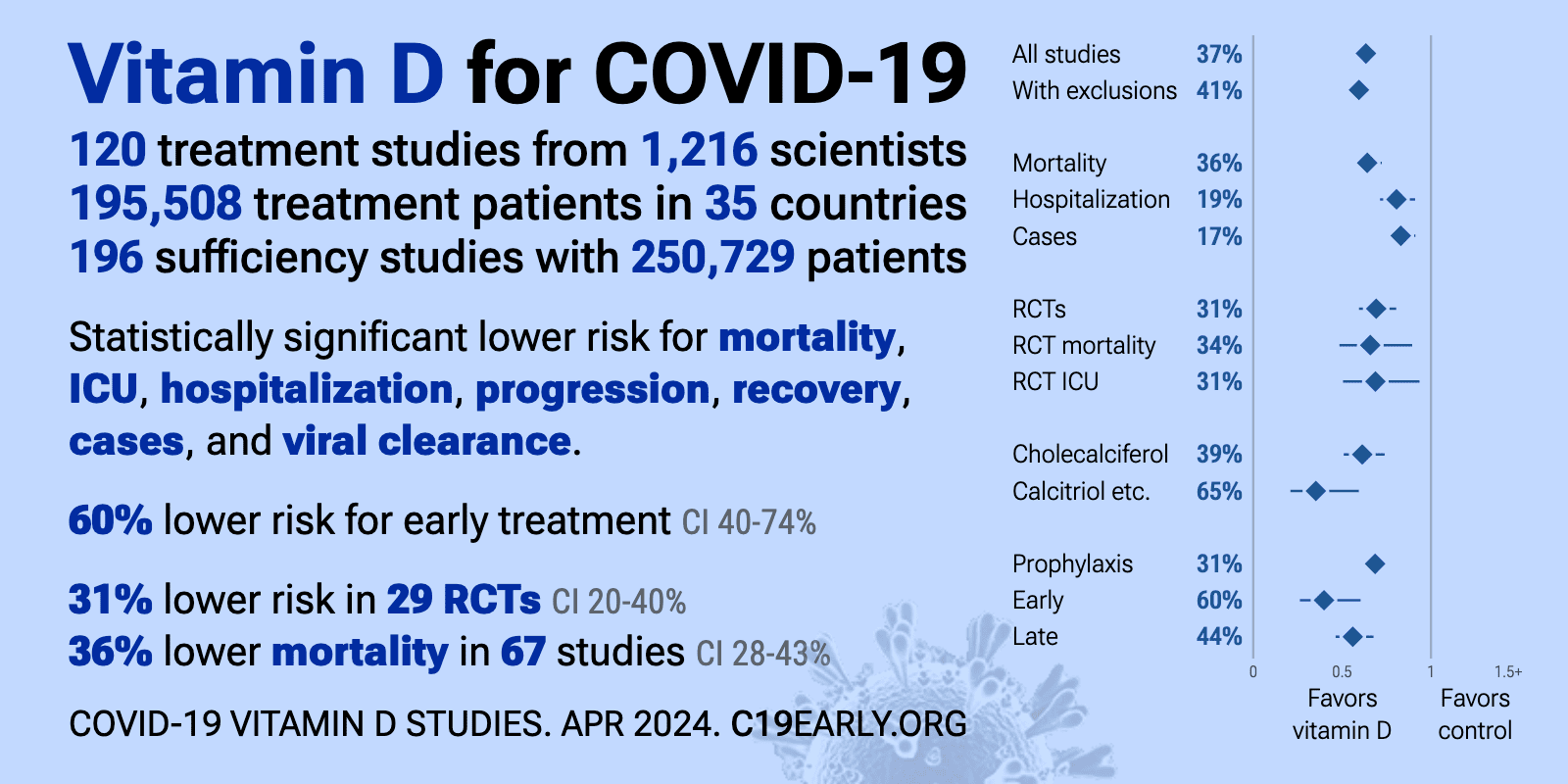COVID ICU use reduced by 42% if take more than 100,000 IU of vitamin D over two weeks – meta-analysis
–-
The impact of supplementing Vitamin D through different methods on the prognosis of COVID-19 patients: A systematic review and metaanalysis
Front. Nutr Sec. Nutrition and Microbes Volume 11 - 2024 | doi: [10.3389/fnut.2024.1441847]
Xiangqun Zhang Xiangqun Zhang *Junyuan Wu Junyuan Wu *Na Shang Na Shang *Yixuan Li Yixuan Li *Ying Zhang Ying Zhang *Shubin ]. Guo Shubin ]. Guo *Hongmeng Dong Hongmeng Dong *Xue Mei Xue Mei *
Department of Emergency Medicine, Beijing Chaoyang Hospital, Capital Medical University, Beijing, China
To analyze the impact of different methods of Vitamin D administration on the prognosis of COVID-19 patients.
Methods: A comprehensive literature search was conducted across four databases: PubMed, Embase, Web of Science, and Cochrane, up to January 5, 2024. Eligible studies included randomized controlled trials and cohort studies that compared Vitamin D supplementation with control groups in COVID-19 patients. Outcomes of interest were mortality rate, ICU (Intensive Care Unit) admission rate, length of hospital stay, and endotracheal intubation rate. Subgroup analyses were performed based on the dosing regimen (single-dose vs. continuous-dose), total Vitamin D intake within 14 days (≥100,000 IU vs. <100,000 IU), and baseline serum Vitamin D levels (deficient group: 25OHD < 30 ng/mL vs. non-restricted group). A random-effects model was employed for meta-analysis to account for heterogeneity among studies.
Results: Vitamin D supplementation significantly reduced the mortality rate (RR=0.72, 95% CI: 0.54-0.94, I²=54%, P=0.02), with continuous dosing being more effective compared to single-dose and lower total doses (<100,000 IU) showing greater benefit . Mortality was significantly reduced in the Vitamin D-deficient group (25OHD < 30 ng/mL) but not in the non-restricted group .
Regarding ICU admission, supplementation reduced ICU admission rates (RR=0.58, 95% CI: 0.38-0.88, I²=74%, P=0.01),, with continuous dosing being more effective than single-dose , and lower doses (<100,000 IU) providing more significant reduction . ICU admission rates were significantly reduced in the Vitamin D-deficient group but not in the non-restricted group. For length of hospital stay, no significant differences were observed between Vitamin D and control groups (MD=-1, 95% CI: -2.16 to 0.16, P=0.13), and subgroup analyses by dosing regimen, total dose, and baseline Vitamin D levels also showed no significant differences. Similarly, for endotracheal intubation, there was no significant difference in intubation rates between groups (RR=0.78, 95% CI: 0.56-1.08, P=0.13).
Conclusion:Vitamin D supplementation improves clinical outcomes in COVID-19 patients by reducing mortality and ICU admission rates, particularly when administered continuously with a total dose of less than 100,000 IU over 14 days, and among those with baseline Vitamin D deficiency (25OHD < 30 ng/mL). However, there were no significant effects on the length of hospital stay or endotracheal intubation rates.
Publisher will provide the PDF “soon”
Meta-analyses of Virus studies
This list is automatically updated
{category}
Vitamin D Life – COVID-19 treated by Vitamin D - studies, reports, videos
{include}

- The above image is automatically updated
